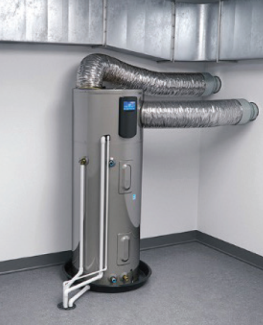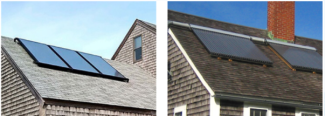Hot Water Heating
Heat Pump

Heat-pump hot-water heaters move heat from the surrounding air to the water inside an insulated hot-water tank. They do this through a similar process to your refrigerator: They use electricity to compress or expand a refrigerant within a closed loop. When the refrigerant expands, its temperature decreases, allowing it to absorb heat from the surrounding air. Then, when the refrigerant is compressed, it gets hotter, which heats the water in the water tank. Because these heaters move heat, rather than release heat through burning fuel, they are extremely energy efficient. If they run on electricity generated by renewable resources, such as solar or wind power, heat pump hot water heaters are a carbon-free way to heat your hot water.
If you are interested in saving money on hot water and taking this step to make your home more environmentally friendly, we recommend you reach out to a contractor to make sure a new heat pump hot water heater is properly sized for your needs. Rebates from your utility’s energy-efficiency programs may also be available for this technology. (See side panel for links) Detailed information about heat-pump hot-water heaters can be found here.
Solar
Solar thermal panels collect energy from the sun during the day and use it to heat water stored in an insulated hot water tank. Unlike typical solar panels (e.g., photovoltaic (PV) panels), solar thermal panels do not create electricity. Instead, they are made specifically to heat water. However, they are similar to PV panels in that they are often attached to the roof of a building.
Because the sun’s energy does the heating, solar thermal systems use very little energy—just a small amount of electricity to circulate the water throughout the system. And if that electricity comes from renewable resources, such as solar or wind power, then the entire system is carbon neutral.
The images below show examples of the two types of solar panels for hot water heating. More information about how they work can be found here

Solar thermal systems are readily available for residential and commercial buildings. However, they may not be able to meet all of your hot water needs in the New England winter. We recommend consulting a contractor to determine if solar thermal hot water combined with a conventional system is right for you.
Incentive Information
Contact Us
Katherine Critelli
